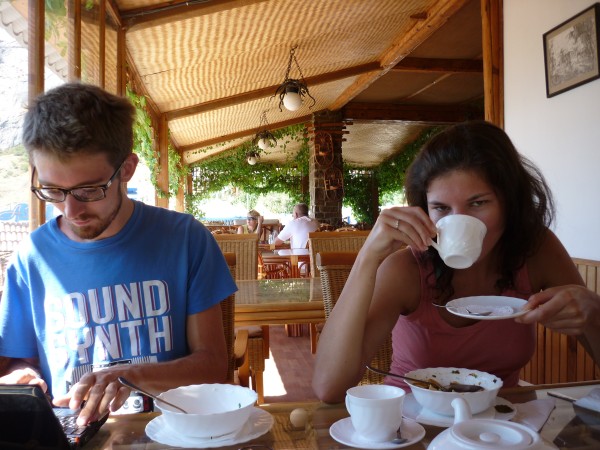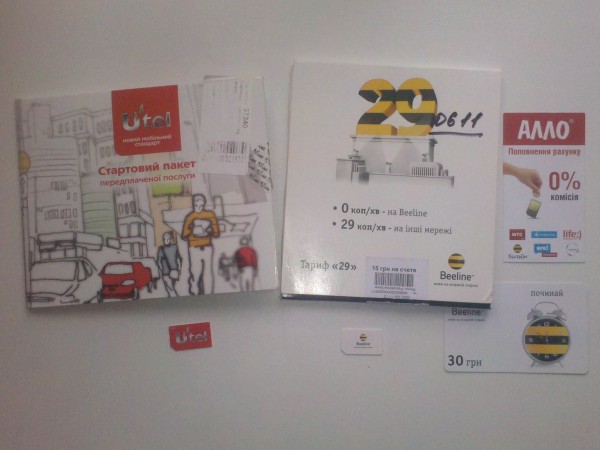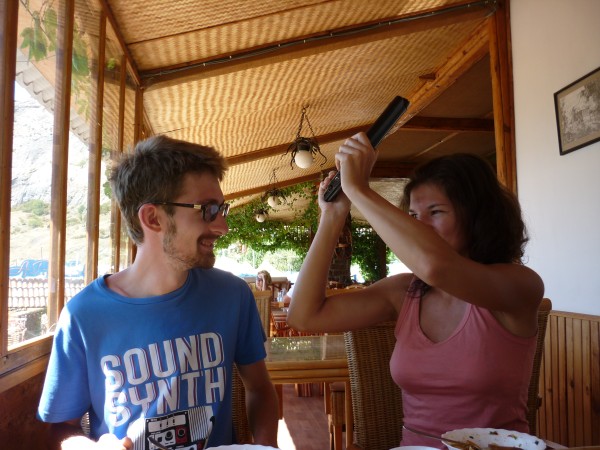Internet in Sudak: personal experience
In the first half of September I left St. Petersburg for Sudak - mostly to rest, but I also had to work a little right there on the netbook, so the Internet was needed. Googling did not quite help in advance to understand how things are with this. Therefore, since such information is in short supply, I decided, returning to Petersburg, to share my own experience with Habr; I think it can help those who gather not only in Sudak, but also in Ukraine as a whole. If in the comments others add to the story with their own experience, it will be generally fine.
Picture to attract attention - I work in Sudak cafe through his wi-fi, sitting next to my girlfriend:

')
The visitor has three main options for Internet access: to find housing, in which he already has, to go somewhere, where there is a wi-fi-network, and buy a local SIM / usb modem. I can’t say anything about the first one (except that housing is in a clear minority), and I actively used both of them. Those familiar with the Internet situation in Crimea said before the trip that you should not count on wi-fi, especially free, but the mobile Internet is surprisingly cheap and fast - in practice in my particular case it turned out almost the opposite.
Wi-Fi . There are official paid places. For example, the sudak_hotspot network operates on the entire city embankment, but it is relatively expensive - 15 hryvnias per hour, that is, 60 rubles (the hryvnia at the moment is almost exactly 4 rubles). In an Internet cafe in the parking lot at the foot of the Genoese fortress is cheaper if you plan to sit for more than an hour: they always take 20 hryvnia and always give access until the end of the working day (just at the beginning of each day they change the total password for everyone), so theoretically it is possible for this amount to spend the whole day. But for myself I found a more attractive option - in the Arzy cafe, the password from their network is reported to everyone who ordered something, and a four-cup tea kettle costs 20 hryvnias there, so compared to the Internet cafe, you get the same money for the same money tea. “Arzy” is not the only such place, look for the Wi-Fi logo at the entrance to the cafe. Eva in the Cypress Alley (the street leading from the city center to the sea) has an open network - if you need a short time on the Internet and your conscience allows, you can connect directly on the street without going to it at all. And the locals, because they live more often in separate houses than in apartment buildings, it seems that they don’t have their networks so much, so if you really need to, you can just walk around the streets and look open.

Mobile Internet . Since Ukraine’s SIM cards can be bought without presenting a passport and without signing anything, they are sold everywhere from trays here. But he did not approach the small open noname-trays, fearing the incompetence of their sellers in matters of Internet-oriented tariffs, but he turned to Kodak tents (they were satisfied with their sellers; in particular, they did not try to sell their goods, but honestly reported where there are better offers than they have) and in the pavilion "Allo" on the Cypress Alley (next to it is the Euroset, but it was closed at that time). I started by asking which operators in Sudak have 3G coverage; answered that MTS and Utel, but MTS has a convenient rate provided only with a USB modem. Since I have an androidphone, on which EasyTether already stands for distributing the Internet to a laptop, I didn’t want to spend money on a USB modem at all, and asked what conditions Utel offers. 10 Ukrainian kopecks (40 Russian) per megabyte seemed quite attractive, and for 50 hryvnia I bought a SIM card with the U'Try tariff, on whose account there were already 30 hryvnia on the Internet and 10 for any use. After that, two pitfalls surfaced. Firstly, in Crimea, all replenish the balance of the phone, buying and activating access cards (only one payment terminal was met all the time, and it was broken), and with Utel the situation is different - you can replenish the account only in Sudak’s central post office. Secondly, although 3G works in the center of Sudak, he lived near the Genoese fortress, in the west of the city - and, as it turned out, Utel doesn’t have its own coverage there, and the Kyivstar 2G-coverage is used instead of it under the roaming agreement. As far as I understand from the Ukrainian-language instructions, roaming does not increase the cost of services, only UTG’s 2G access and already without roaming amounts to 40 kopecks versus 10 3G-shnyh, not to mention the fact that it is much slower. Since I didn’t want to go from the outskirts to the central post office, when the money on the Utelovskaya Simka ran out, I decided to just change the operator, no longer relying on 3G. Having described the situation to the seller, he received the answer that then it is worth taking a biline sim card: there you can buy Internet traffic in packages, and if you buy a large one, the price of one megabyte turns out to be low. It wasn’t possible to purchase the package immediately (their prices were given in the instructions, but not a word was said about how to order them, the robots for reference numbers were ready to give information about everything, except that, the SIM menu didn’t help much either), but as a result, it was possible to find the number of the required USSD request on the same Internet. I bought a gigabyte package for 80 hryvnias - to this amount, for some reason, the deduction to the Ukrainian Pension Fund is added, but even with it the price of a megabyte is below 10 Ukrainian kopecks. I lived with this Internet until the end of the trip - I couldn't call it fast, but it worked. Some sites on the netbook stubbornly did not want to be loaded - they coped with this by opening them on the communicator. As I understood later, I was greedy when buying a large package because of the favorable price of a megabyte: it was still possible to sit out at a low speed before departure, but in St. Petersburg, although Simka successfully connected to the local Beeline, it was impossible to complete the use of this package.
The result: for two weeks, during which every weekday spent an hour or two on the Internet, spent about a thousand rubles on it (however, it is not clear how to count the money spent in a cafe for food) and unexpectedly a lot of nerve cells. If, before the trip, I had the experience I had, I would have spent 500 rubles and a minimum of nerve costs.
Picture to attract attention - beloved girl beats on the head with a netbook for too long work:

Picture to attract attention - I work in Sudak cafe through his wi-fi, sitting next to my girlfriend:

')
The visitor has three main options for Internet access: to find housing, in which he already has, to go somewhere, where there is a wi-fi-network, and buy a local SIM / usb modem. I can’t say anything about the first one (except that housing is in a clear minority), and I actively used both of them. Those familiar with the Internet situation in Crimea said before the trip that you should not count on wi-fi, especially free, but the mobile Internet is surprisingly cheap and fast - in practice in my particular case it turned out almost the opposite.
Wi-Fi . There are official paid places. For example, the sudak_hotspot network operates on the entire city embankment, but it is relatively expensive - 15 hryvnias per hour, that is, 60 rubles (the hryvnia at the moment is almost exactly 4 rubles). In an Internet cafe in the parking lot at the foot of the Genoese fortress is cheaper if you plan to sit for more than an hour: they always take 20 hryvnia and always give access until the end of the working day (just at the beginning of each day they change the total password for everyone), so theoretically it is possible for this amount to spend the whole day. But for myself I found a more attractive option - in the Arzy cafe, the password from their network is reported to everyone who ordered something, and a four-cup tea kettle costs 20 hryvnias there, so compared to the Internet cafe, you get the same money for the same money tea. “Arzy” is not the only such place, look for the Wi-Fi logo at the entrance to the cafe. Eva in the Cypress Alley (the street leading from the city center to the sea) has an open network - if you need a short time on the Internet and your conscience allows, you can connect directly on the street without going to it at all. And the locals, because they live more often in separate houses than in apartment buildings, it seems that they don’t have their networks so much, so if you really need to, you can just walk around the streets and look open.

Mobile Internet . Since Ukraine’s SIM cards can be bought without presenting a passport and without signing anything, they are sold everywhere from trays here. But he did not approach the small open noname-trays, fearing the incompetence of their sellers in matters of Internet-oriented tariffs, but he turned to Kodak tents (they were satisfied with their sellers; in particular, they did not try to sell their goods, but honestly reported where there are better offers than they have) and in the pavilion "Allo" on the Cypress Alley (next to it is the Euroset, but it was closed at that time). I started by asking which operators in Sudak have 3G coverage; answered that MTS and Utel, but MTS has a convenient rate provided only with a USB modem. Since I have an androidphone, on which EasyTether already stands for distributing the Internet to a laptop, I didn’t want to spend money on a USB modem at all, and asked what conditions Utel offers. 10 Ukrainian kopecks (40 Russian) per megabyte seemed quite attractive, and for 50 hryvnia I bought a SIM card with the U'Try tariff, on whose account there were already 30 hryvnia on the Internet and 10 for any use. After that, two pitfalls surfaced. Firstly, in Crimea, all replenish the balance of the phone, buying and activating access cards (only one payment terminal was met all the time, and it was broken), and with Utel the situation is different - you can replenish the account only in Sudak’s central post office. Secondly, although 3G works in the center of Sudak, he lived near the Genoese fortress, in the west of the city - and, as it turned out, Utel doesn’t have its own coverage there, and the Kyivstar 2G-coverage is used instead of it under the roaming agreement. As far as I understand from the Ukrainian-language instructions, roaming does not increase the cost of services, only UTG’s 2G access and already without roaming amounts to 40 kopecks versus 10 3G-shnyh, not to mention the fact that it is much slower. Since I didn’t want to go from the outskirts to the central post office, when the money on the Utelovskaya Simka ran out, I decided to just change the operator, no longer relying on 3G. Having described the situation to the seller, he received the answer that then it is worth taking a biline sim card: there you can buy Internet traffic in packages, and if you buy a large one, the price of one megabyte turns out to be low. It wasn’t possible to purchase the package immediately (their prices were given in the instructions, but not a word was said about how to order them, the robots for reference numbers were ready to give information about everything, except that, the SIM menu didn’t help much either), but as a result, it was possible to find the number of the required USSD request on the same Internet. I bought a gigabyte package for 80 hryvnias - to this amount, for some reason, the deduction to the Ukrainian Pension Fund is added, but even with it the price of a megabyte is below 10 Ukrainian kopecks. I lived with this Internet until the end of the trip - I couldn't call it fast, but it worked. Some sites on the netbook stubbornly did not want to be loaded - they coped with this by opening them on the communicator. As I understood later, I was greedy when buying a large package because of the favorable price of a megabyte: it was still possible to sit out at a low speed before departure, but in St. Petersburg, although Simka successfully connected to the local Beeline, it was impossible to complete the use of this package.
The result: for two weeks, during which every weekday spent an hour or two on the Internet, spent about a thousand rubles on it (however, it is not clear how to count the money spent in a cafe for food) and unexpectedly a lot of nerve cells. If, before the trip, I had the experience I had, I would have spent 500 rubles and a minimum of nerve costs.
Picture to attract attention - beloved girl beats on the head with a netbook for too long work:

Source: https://habr.com/ru/post/104299/
All Articles